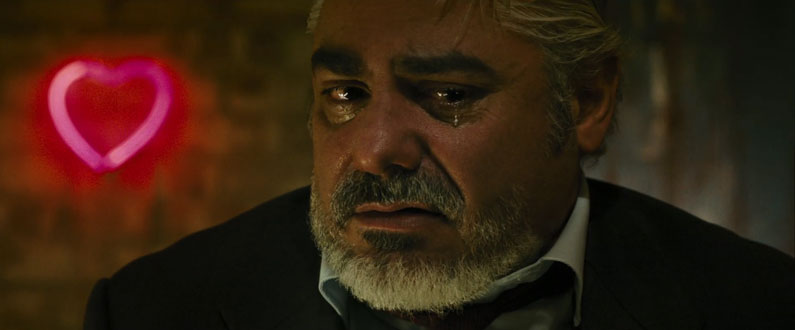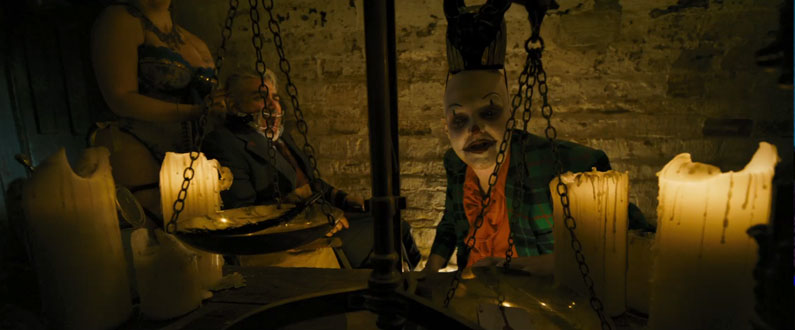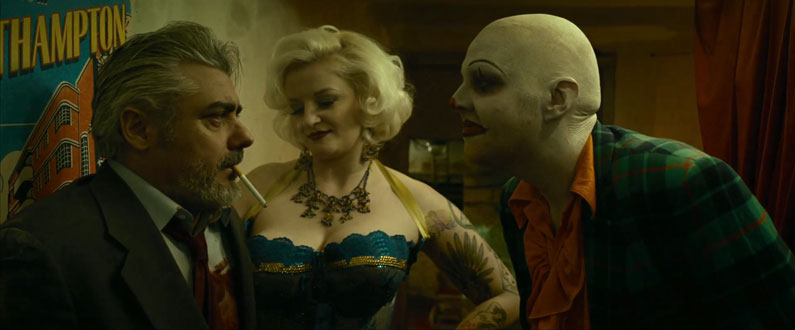(Note: This piece contains spoilers for His Heavy Heart — which was released to supporters of its Kickstarter campaign in August, 2014 — and the other films that make up the series called Show Pieces).

Faith Harrington and James Mitchum leave our world to find themselves in a peculiar working men’s club in the English town of Northampton. It is a strange and unstable place. Nothing is quite rational. There is a clown, a burlesque dancer, a stage. There are nefarious managers, manipulating and twisting a surreal landscape. Everywhere there is merciless, cold judgement. This is the world of The Show, a series of short films written by Alan Moore and directed by Mitch Jenkins, that give us fragmented glimpses of the afterworld. We enter it with trepidation, and yet its elusiveness compels reflection and stokes a desire for answers.
The first four films proceed from a shocking death to the opening of a door leading into a quicksand of damnation. As Faith and James plunge deeper into the club's depths, they seek out something comprehensible, something they can understand and hold onto, but encounter only the oddity and harshness of its denizens. They find no consolation. There are no exits here. They are alone. Mirrors distort and, in the back, Tarot cards are flipped, auguring alterations in the dark order. Soon, a show is performed, with James at the blistering light of its centre. He steps up onto the stage and is born into this new world.
The splintered narrative of Show Pieces culminates in the fifth film, His Heavy Heart. It is 30 minutes that brims with chilling horror, but it is potent and powerful and the best film in the series. In it, James Mitchum is pushed to his limits, passing through the last stage of death’s denial, of wailing and screaming, before he can accept his fate. Preceding this, he is subject to a kind of raging fire that threatens to consume him.
The voice of that fire is the clown alive with fury in the gloomy underground of the working men’s club. He is the master of ceremonies, shepherding James — his mouth pried open as he sits strapped to a chair — “less than gently into his unenviable afterlife,” to use Moore’s words. The burlesque dancer hovers above, the clown’s loyal assistant, as unsympathetic to James as everybody else here, always ready with a smile and a laugh.1

The clown proceeds through a funerary rite from the Egyptian Book of the Dead, measuring Mitchum’s heart (in the form of a Ace of hearts with a trickle of blood at its centre) against that of the feather of silence and truth, “the plume of Maat.” If the weight of his sins exceed that of purity, measured by the feather, he has failed. The clown, an open book in his hand, confronts James about his sins. In life, has he “extinguished the fire at its critical moment,” blotting out goodness in favour of the darkest impulses of the human heart? If so, the weight of his sins may tip heavy on the scales of justice. Inevitably, they do. He fails. He must be punished.
In the most macabre moment of the film, James is ushered in to meet his ultimate fate, to be consumed by The Porpoise, a fat man who sits at a table cutting through something dark and bloody on a white plate, his mouth contorted by the etched lines of voracious consumption. As the clown had told James moments earlier, “You’re a consumer. It’s only fair that you get consumed.” There is screaming. The Porpoise anticipates his imminent meal with relish. James pleads for his “life.”2
At the last moment, James is given a deal. He will not be consumed but, in return for being saved, his fate is now entirely in the hands of the clown and the burlesque dancer. From now on, he must be their loyal and unquestioning servant in the strange hierarchy of the afterlife. The clown compels James to “shack up” with him, mentioning certain obligations that accompany such an arrangement. James has not quite processed this. He longs to return to his former life, to Northampton past.
That world is now foreclosed to him. He cannot enter it. But he is given a last look at its remnants. Through an open door, through the rain, he peers past the barrier that separates life from death, and in that moment there is a sense of quiet acceptance. It is no doubt temporary, a short respite from the horror of damnation. But it is a moment. It lingers in the distance of the flat reality beyond the working men’s club, in the dark of an endless night sky, of a slow fade to permanent black.

1. Andrew Buckley is the clown, in a searing performance; Khandie Khisses is the burlesque dancer, and Darrell D’Silva is the hapless James Mitchum. ↩
2. In the Egyptian Book of the Dead, the demon that consumes the heart is Ammit, or The Devourer. ↩
I take a more detailed look at Alan Moore’s body of work in my 2012 post A New Beast, a review of Gary Spencer Millidge’s book Alan Moore Storyteller.